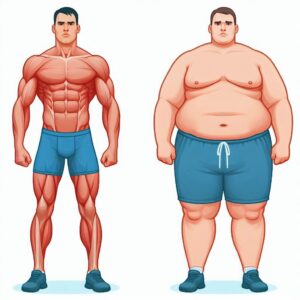雲泥の差とは?
「雲泥の差」(うんでいのさ)は、日本のことわざで、「二つのものの間に非常に大きな差があること」を意味します。
雲(空高くに浮かぶもの)と泥(地面にある汚れたもの)の間には、位置や性質においてまったく違う特徴があり、その距離や違いを比喩的に表現しています。
言葉の意味
雲と泥の象徴的な意味
「雲」:高貴さ、清らかさ、手の届かない遠い存在を象徴。
「泥」:低俗さ、汚れたもの、足元の現実を象徴。
比喩的な意味
二つのものが、能力、地位、価値、性質などあらゆる点で大きな差があること。
差が「極端に大きい」ことを強調する表現。
背景と由来
禅や仏教の影響
「雲泥の差」という表現は、仏教や禅の教えに由来していると言われています。
雲は「悟り」や「高次元の境地」を表し、泥は「煩悩」や「俗世の迷い」を象徴。悟りを開いた者とそうでない者の間には「雲泥の差」があるとされました。
自然の比喩
天と地ほどの距離感がある雲と泥の関係性を通じて、違いや隔たりを視覚的に分かりやすく示しています。
使用される場面
能力や実力の比較
例:「あの選手と私では雲泥の差がある」
一方が圧倒的に優れている場合に用います。
経済的な格差
例:「彼の生活と私の生活は雲泥の差だ」
収入や生活水準が大きく異なる状況を示します。
性格や人柄の違い
例:「兄と弟の性格は雲泥の差だ」
二人の性格や行動が全く異なる場合を表現。
具体例
学業成績の違い
状況:同じ試験を受けても、ある生徒は満点、別の生徒は半分以下の点数。
表現:「二人の成績には雲泥の差がある。」
製品の品質の違い
状況:高級ブランドの製品と安価な模造品を比較。
表現:「このバッグとあのバッグでは品質に雲泥の差がある。」
経済力の違い
状況:裕福な家庭と貧困家庭の間の生活の差。
表現:「この地域と都会では生活水準に雲泥の差がある。」
類義語
日本語の類似表現
「天と地の差」:天と地ほどの隔たりを強調した表現。
「月とすっぽん」:似ているようで全く異なることを表現。
「段違い」:実力やレベルの差が非常に大きいこと。
英語の類似表現
「A world of difference.」:非常に大きな違いを表現。
「Like night and day.」:夜と昼ほど異なること。
心理的な側面と影響
比較の心理
「雲泥の差」を感じるとき、人は自分と他人や状況を比較して劣等感や優越感を抱きがちです。
特に現代のSNSでは、人々の生活が可視化されることで、格差を感じやすい環境が広がっています。
成長のモチベーションにもなる
一方で、「雲泥の差」がある相手に憧れたり、目標を持つことで努力を重ね、成長するきっかけになることもあります。
使用時の注意点
ネガティブなニュアンスが含まれる場合
差を強調することで、相手を傷つける可能性があるため、配慮が必要です。
状況に応じた表現選び
比較的軽い差を表現したい場合には、「大きな違い」や「少しの差」という表現が適切です。
教訓と現代社会への適用
「雲泥の差」という表現は、優劣や格差を冷静に認識する一方で、それをどのように受け止めるかが重要です。
現代社会では、努力や環境によってその差を縮めることが可能な場合も多く、「雲泥の差」に対してポジティブに向き合う姿勢が求められます。
「雲泥の差」は、二つのものの間に極端な違いがあることを表現する言葉です。その背景には仏教的な価値観や自然の比喩があり、日常生活の中で能力、価値観、経済状況などを比較する際に使われます。このことわざは、ただ違いを指摘するだけでなく、そこから学びや成長のきっかけを見出すことも可能です。
Undei no difference” (雲泥の差) is a Japanese proverb meaning ”a very great difference between two things.”
It figuratively expresses the distance and difference between clouds (things floating high in the sky) and mud (dirty things on the ground), which have completely different characteristics in terms of position and properties.Meaning of the word
Symbolic meaning of cloud and mud
Cloud”: symbolizes nobility, purity, unreachable and distant.
Mud”: symbolizes lowliness, dirtiness, the reality beneath our feet.Figurative meaning
A great difference between two things in any respect, such as ability, status, value, or nature.
An expression emphasizing that the difference is “extremely great”.Background and Origin
Zen and Buddhist influences
The expression “cloud difference” is said to have its origin in the teachings of Buddhism and Zen.
Clouds represent “enlightenment” or “a higher state of being,” while mud symbolizes “vexation” or “the vagaries of the mundane world. It was believed that there is a “cloud difference” between those who are enlightened and those who are not.Metaphor of Nature
Through the relationship between clouds and mud, which are as far apart as the heavens and the earth, the difference and gap between them is shown visually in a way that is easy to understand.Situations in which it is used
Comparison of abilities and capabilities
e.g., “There is a huge difference between that athlete and me.
Used when one is overwhelmingly superior to the other.Economic disparity
e.g., “There is a huge difference between his life and mine.
Indicates a situation in which income and standard of living are very different.Difference in character or personality
e.g., “My brother and I have very different personalities.”
Expresses a situation in which two people have completely different personalities and behaviors.Specific examples
Difference in academic performance
Situation: One student gets a perfect score and another student gets less than half a grade on the same exam.
Expression: “There is a big difference between their grades.”Difference in product quality
Situation: Comparing a luxury brand product with a cheap imitation.
Expression: “There is a huge difference in quality between this bag and that bag.”Difference in economic power
Situation: Difference in lifestyle between a wealthy family and a poor family.
Expression: “There is a huge difference in the standard of living between this area and the city.”Synonyms
Similar expressions in Japanese
Difference between heaven and earth: An expression that emphasizes the difference between heaven and earth.
Tsuki to suppon”: to describe something that is similar but completely different.
Dankai”: to be very different in ability or level.Similar expressions in English
A world of difference.
Like night and day.Psychological Aspects and Influences
Psychology of Comparison
When people feel a “cloud of difference,” they tend to compare themselves with others and their circumstances and feel a sense of inferiority or superiority.
Especially with today’s social networking sites, where people’s lives are visualized, it is easy to feel disparity.It can be a motivation for growth.
On the other hand, it can also be an opportunity to make efforts and grow by admiring others who have “cloud over them” or by having a goal.Cautions for use
When negative nuance is included
Emphasizing differences may hurt the other party, so care must be taken.Selecting expressions according to the situation
When you want to express a relatively light difference, the expressions “a big difference” or “a little difference” are appropriate.Lessons Learned and Application to Modern Society
While the expression “a cloud of difference” calmly recognizes superiority or disparity, it is important to know how to perceive it.
In modern society, it is often possible to narrow the gap through effort and environment, and a positive attitude toward the “difference between the two” is required.Undo-no-gai” is a term used to describe the extreme difference between two things. It has Buddhist values and natural metaphors behind it, and is used in everyday life to compare abilities, values, and economic situations. The proverb not only points out differences, but also allows us to find opportunities for learning and growth from them.
AIが描いた「雲泥の差」






















コメント